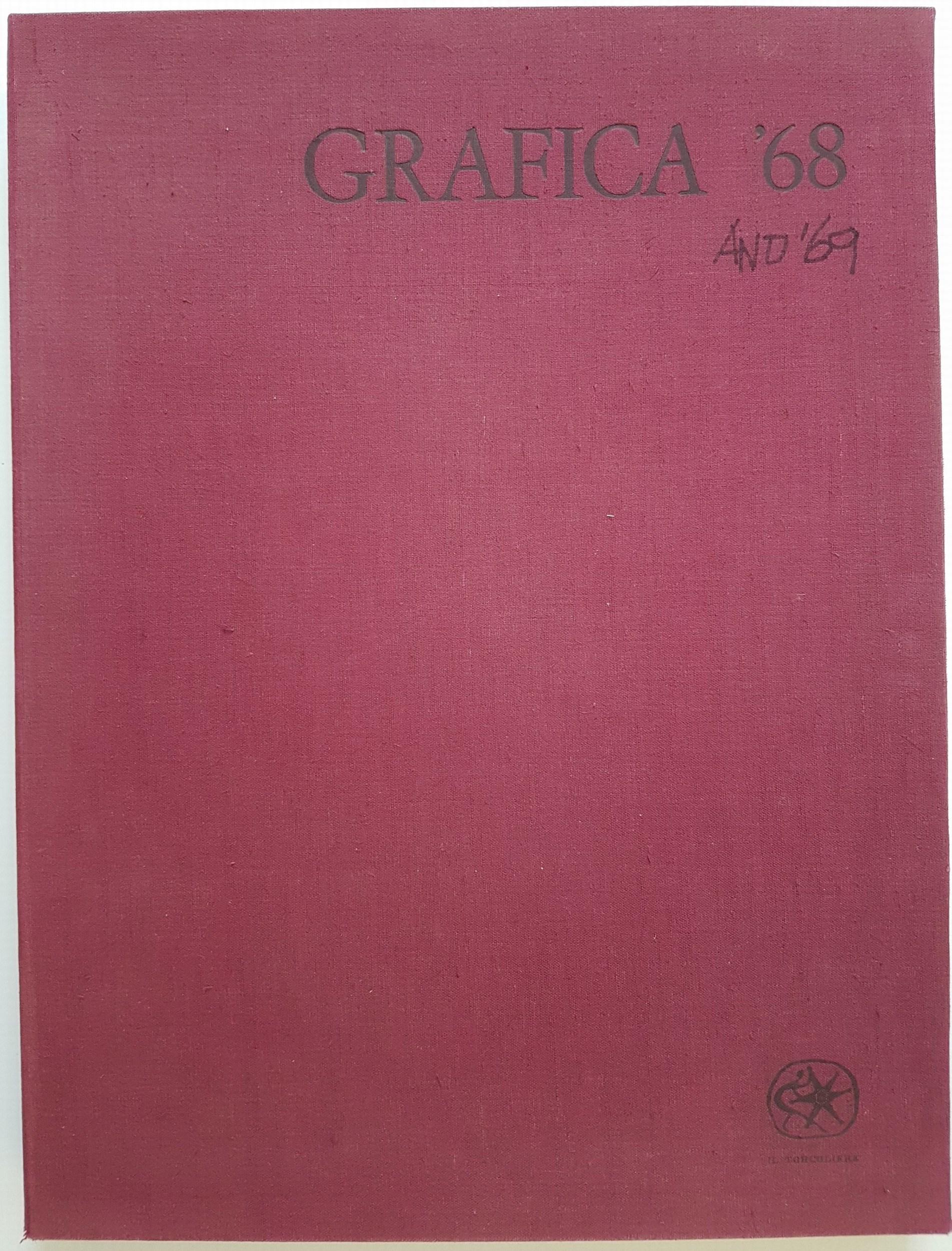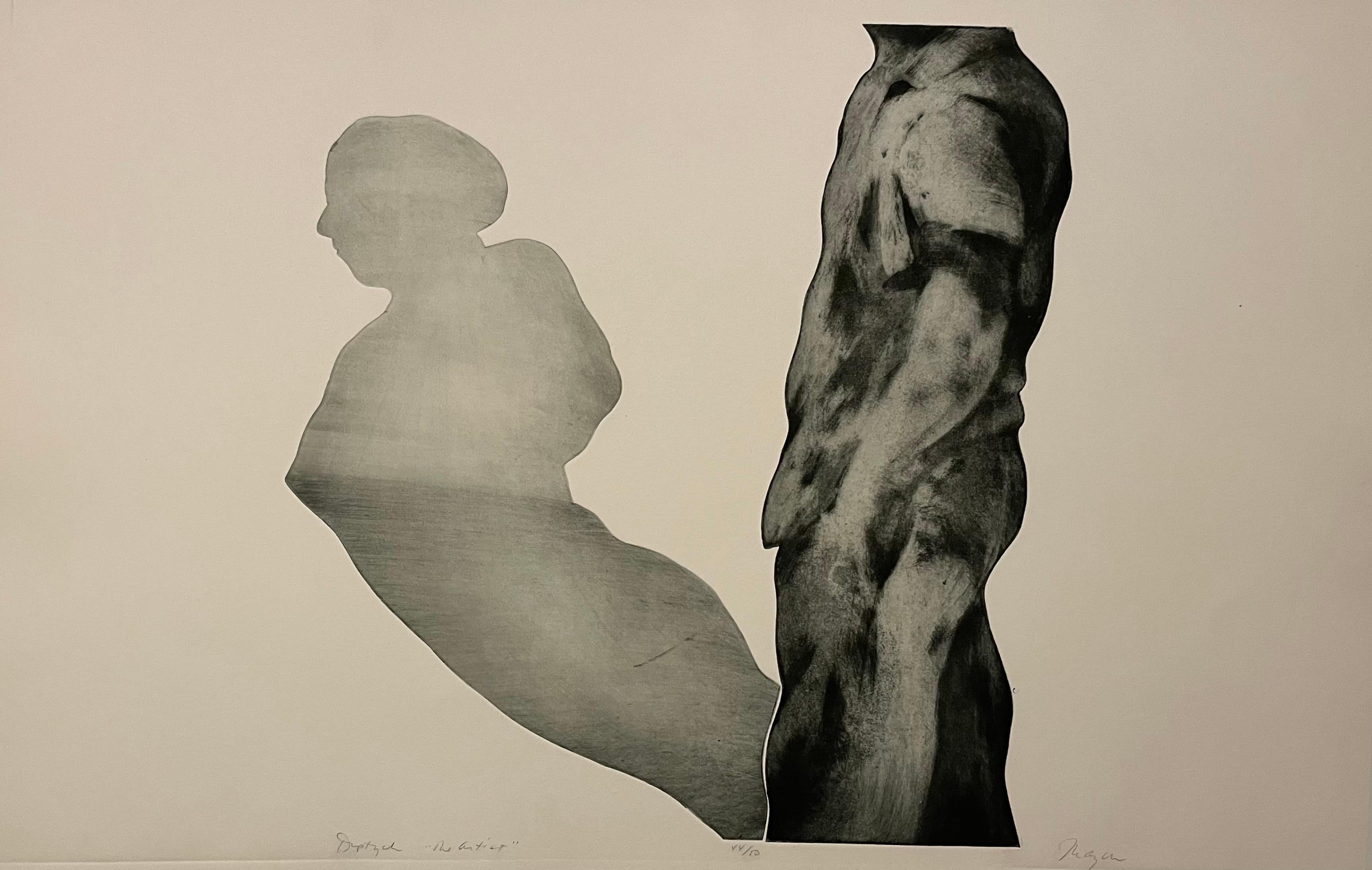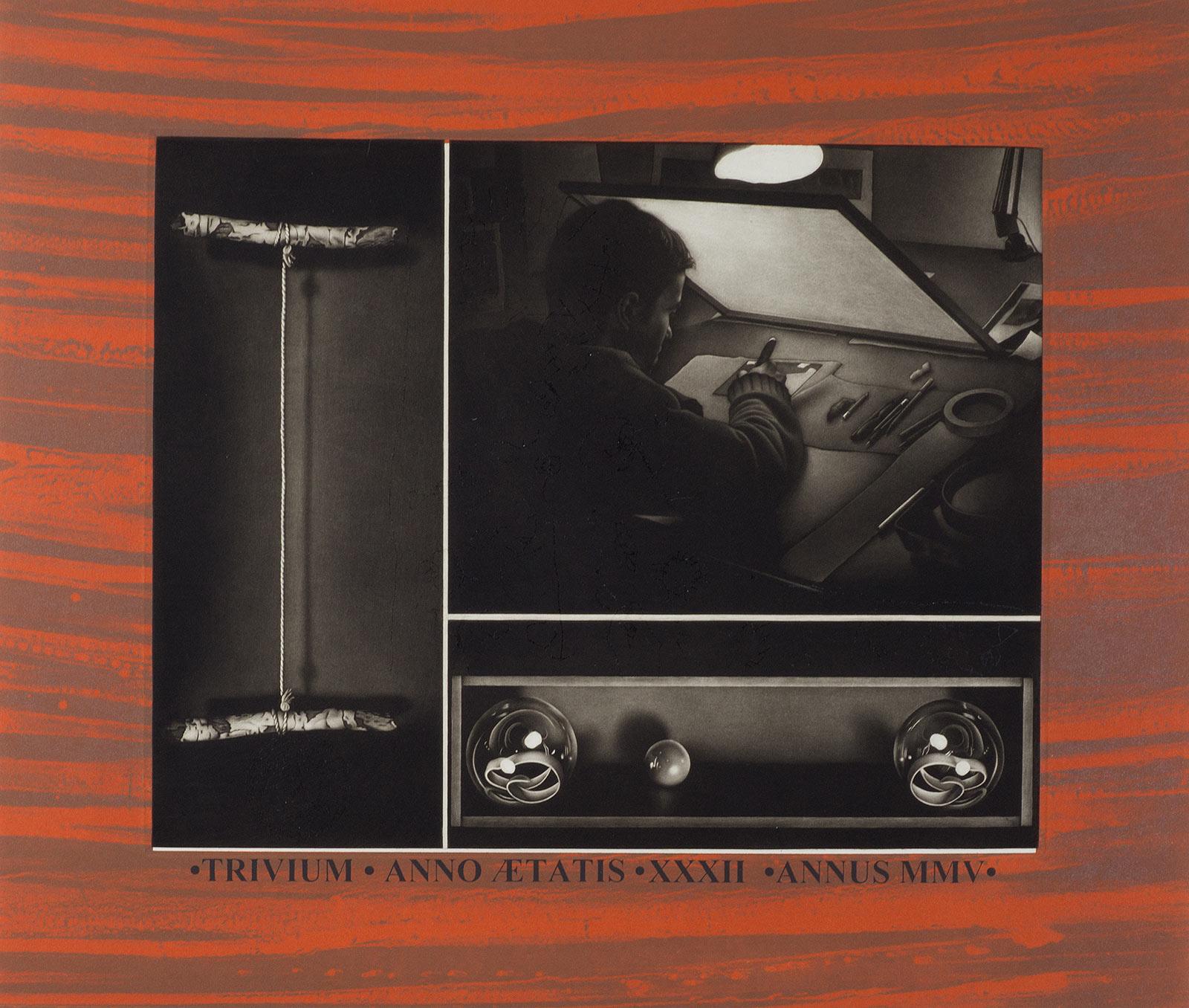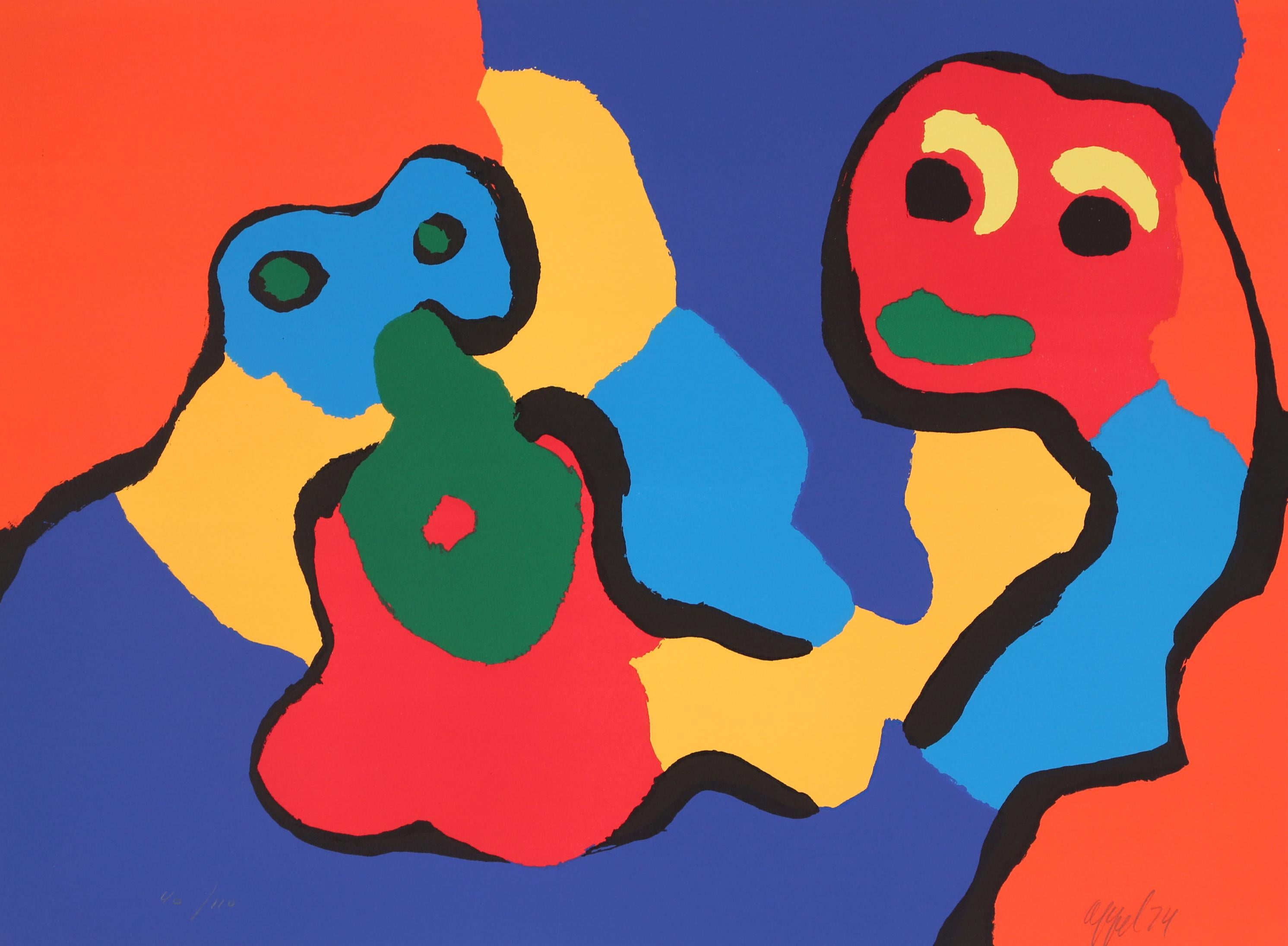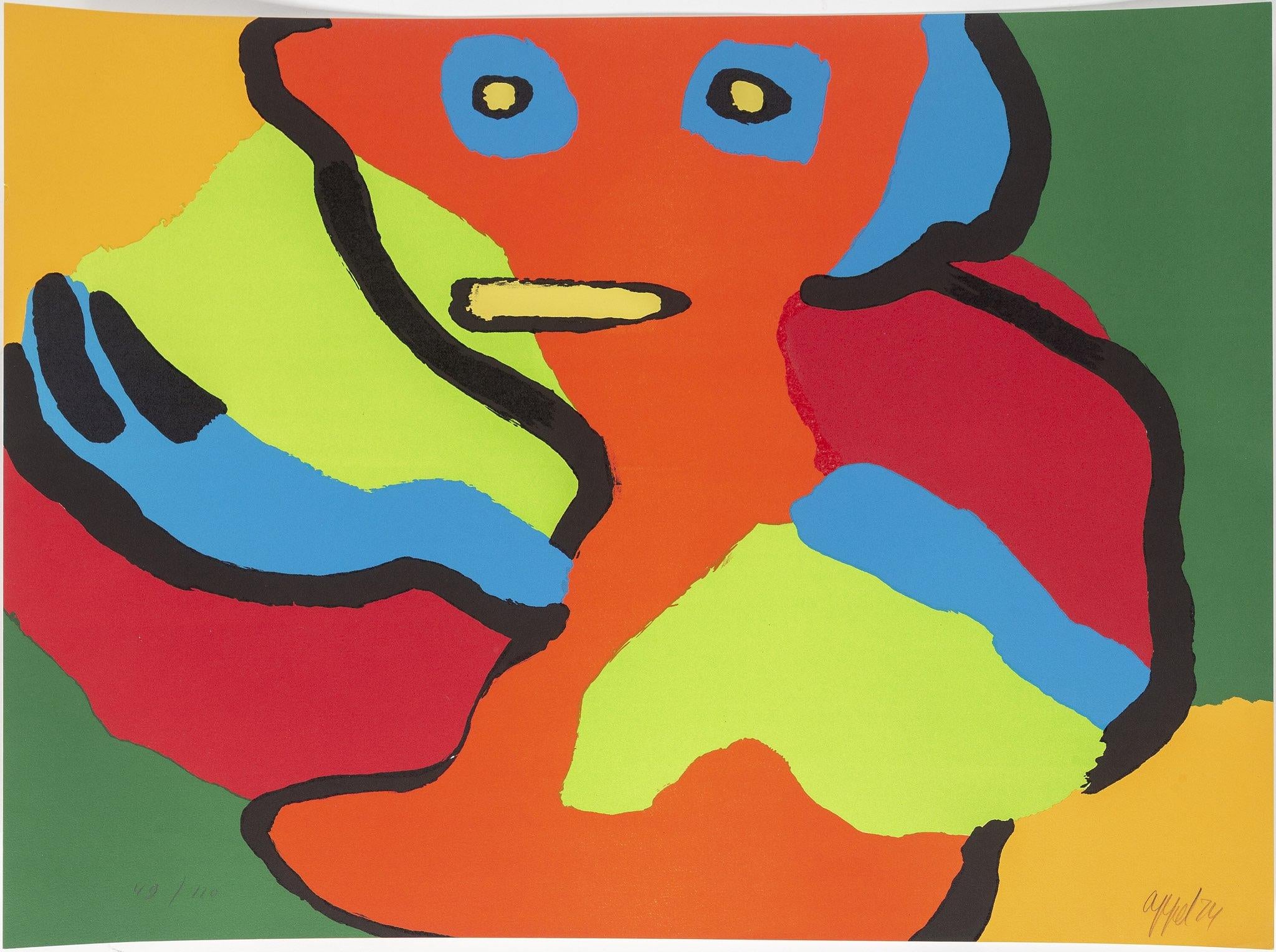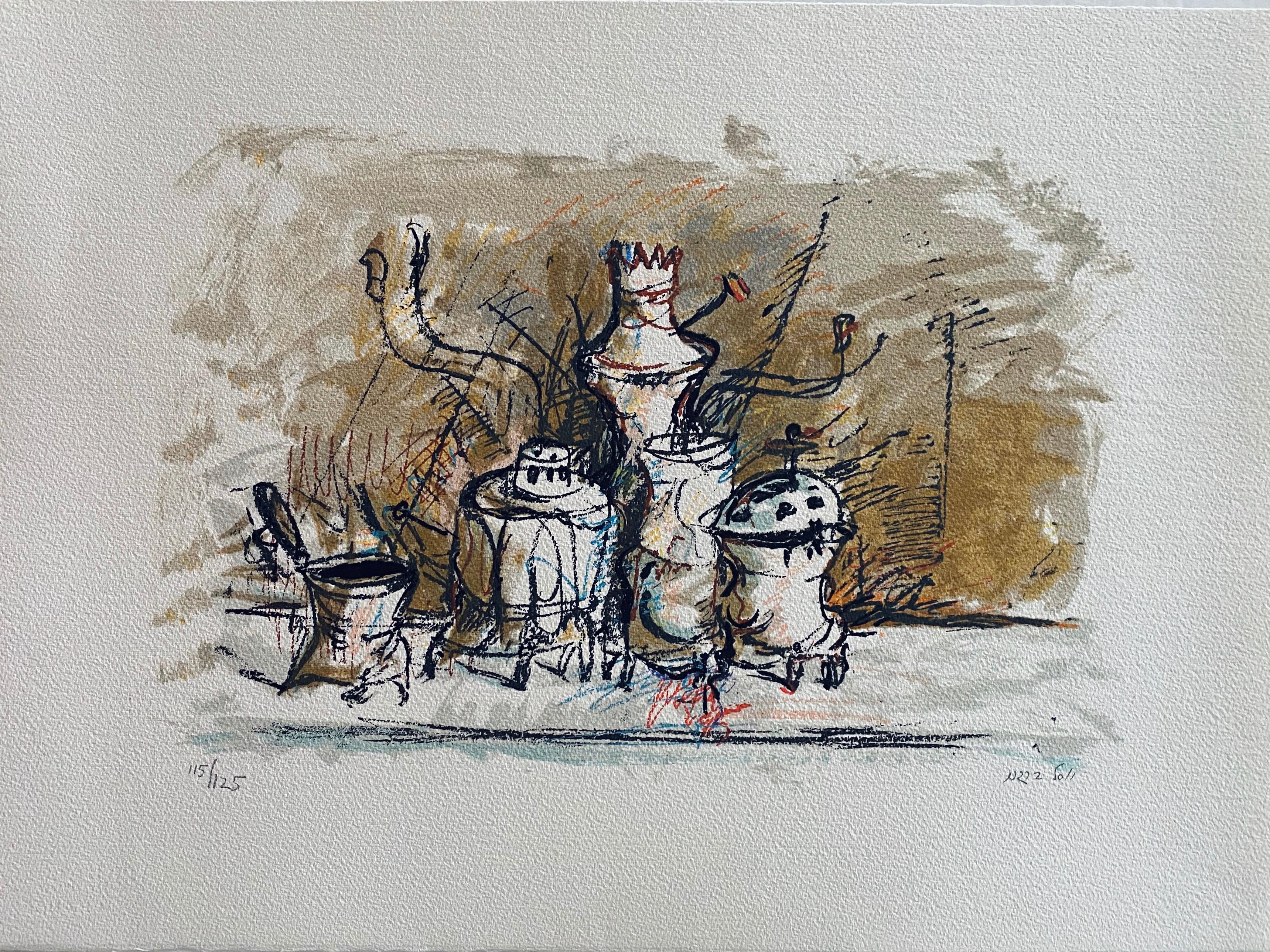Items Similar to Sharaku
Want more images or videos?
Request additional images or videos from the seller
1 of 10
Gaston PetitSharaku1980
1980
About the Item
Gaston Petit
Sharaku
Color Lithograph and Silkscreen
Year: 1980
Size: 27.6X17.6in
Edition: 85
Signed and dated by hand
COA provided
Ref.: 924802-1200
Father Gaston Petit who is a Dominican priest from Shawinigan, Quebec. Since 1966, Petit has been stationed in Tokyo, Japan, where he practices as a painter, a sculptor, a printmaker, and a stained glass designer. While not having set out to become an artist, it was through his studies and exposure to theology and philosophy that Petit found his creative self. After demonstrating his extraordinary skill in the design and ornamentation of several chapels and churches in Japan, Petit was given permission by the Clergy to devote himself to sacred art. With no formal artistic training, he was sent to Europe to study the many exquisite churches of France, Germany, and Belgium. He also took advantage of visits to Cambodia, Thailand, India, Afghanistan, and Iran to soak in the Eastern and Middle Eastern cultures. Petit’s personal artistic practice evolved from his vocation to build places of worship. His cross-cultural experiences play a prominent role in his work, which he sees as a way to explore the concept of being and its relationship with divinity. Nourished by the evocation of religious symbols, both spiritual and philosophical, Petit mixes references from his Catholic priesthood, as well as elements of Taoist, Buddhist, and Hindu religions. Although his stylistic influences fall within fauvism and surrealism, Petit's own approach to art is a medieval one, in which art serves as part of ritual rather than for static viewing. As an artist, Petit says “Conscious of it or not, an artist is pushed by the desire to leave something to humanity,” but as a priest he adds “The true artist aims at participating, by analogy, in God’s power of creation. He dresses himself in the Creator’s vestments.
- Creator:Gaston Petit (1933)
- Creation Year:1980
- Dimensions:Height: 27.6 in (70.11 cm)Width: 17.6 in (44.71 cm)
- Medium:
- Movement & Style:
- Period:
- Framing:Framing Options Available
- Condition:
- Gallery Location:Kansas City, MO
- Reference Number:1stDibs: LU608311208262
About the Seller
5.0
Platinum Seller
These expertly vetted sellers are 1stDibs' most experienced sellers and are rated highest by our customers.
Established in 2016
1stDibs seller since 2017
952 sales on 1stDibs
Typical response time: <1 hour
- ShippingRetrieving quote...Ships From: Kansas City, MO
- Return PolicyA return for this item may be initiated within 7 days of delivery.
More From This SellerView All
- (Partial) Portfolio containing 3 (three) lithographs and etchingsBy GraficaLocated in Kansas City, MOGrafica '68 (Partial) Portfolio containing 3 (three) lithographs and etchings Originally issued with 10 Lithographs, Silk Screens and Etchings, of which 7 (seven) are missing Year: 1968 Edition: 100 Size: 17.6 x 23.6 in. or 23.6 x 17.6 in. Publisher: Il Torcoliere, Rome - Italy Signatures: Sheets signed and numbered by hand Comes with folio box and individual artists' presentation sheets. --------------------------------- Artists works included: RENZO VESPIGNANI "Report on the artist" Year: 1968 Medium: Lithograph in two colors Edition: 100 Size: 17.6 x 23.6 in. Publisher: Il Torcoliere, Rome - Italy Signed and numbered Ref: RVE_1909_01 LUCIANO DE VITA "Le cavalier inconnu" Year: 1968 Medium: Etching Edition: 100 Size: 23.6 x 17.6 in. Publisher: Il Torcoliere, Rome - Italy Signed and numbered Ref: LDV_1909_01 PIERO GUCCIONE "Images" Year: 1968 Medium: Lithograph in four colors Edition: 100 Size: 23.6 x 17.6 in. Publisher: Il Torcoliere, Rome - Italy Signed and numbered Ref: PGU_1909_01 ======================= Renzo Vespignani was an Italian painter, printmaker and illustrator. Vespignani illustrated the works of Boccaccio, Kafka and T. S. Eliot, among others. In 1956, he co-founded the magazine Citta Aperta and in 1963, co-founded the group II Pro e II Contro for neorealism in figure art. ---------------- Luciano De Vita ( Ancona , 1929 - 1992 ) was an Italian painter , engraver , set designer and lecturer . Born in Ancona, De vita arrived in Bologna in the first post-war period, after having actively participated in the Second World War and having suffered the dramatic consequences. He attended the Academy of Fine Arts and was a pupil of Giorgio Morandi. From 1962 he taught in Milan at the Brera Academy , while in 1975 he returned to Bologna where he obtained the same chair of engraving that had been Morandi's from 1930 to 1956 . De Vita also actively dedicated himself to the theater , overseeing sets and costumes for shows that were also staged at La Scala in Milan. An example is the Turandot curated by Raoul Grassilli. ---------------- Emilio Vedova (9 August 1919 – 25 October 2006) was a modern Italian painter...Category
1960s Modern Figurative Prints
MaterialsEtching, Lithograph, Screen
- Prego, s'accomodiBy Bruno BruniLocated in Kansas City, MOBruno Bruni Prego, s'accomodi Year: 1969 Serigraph Size: 29.5x24 inches Signed, numbered and dated by hand Edition: 99 Annotated verso Publisher: Il Torcoliere, Rome, Italy Printer: ...Category
1960s Modern Prints and Multiples
MaterialsScreen
- RitornoBy Bruno BruniLocated in Kansas City, MOBruno Bruni Ritorno Year: 1969 Serigraph Size: 29.5x24 inches Signed, numbered and dated by hand Edition: 99 Annotated verso Publisher: Il Torcoliere, Rome, Italy Printer: Böer, Hamb...Category
1960s Modern Prints and Multiples
MaterialsScreen
- HelpBy Bruno BruniLocated in Kansas City, MOBruno Bruni Help Year: 1969 Serigraph Size: 29.5x24 inches Signed, numbered and dated by hand Edition: 99 Annotated verso Publisher: Il Torcoliere, Rome, Italy Printer: Böer, Hamburg...Category
1960s Modern Prints and Multiples
MaterialsScreen
- MelancholiaBy Bruno BruniLocated in Kansas City, MOBruno Bruni Melancholia Year: 1969 Serigraph Size: 29.5x24 inches Signed, numbered and dated by hand Edition: 99 Annotated verso Publisher: Il Torcoliere, Rome, Italy Printer: Böer, ...Category
1960s Modern Prints and Multiples
MaterialsScreen
- MelancholiaBy Bruno BruniLocated in Kansas City, MOBruno Bruni Contemplazione Year: 1969 Serigraph Size: 29.5x24 inches Signed, numbered and dated by hand Edition: 99 Annotated verso Publisher: Il Torcoliere, Rome, Italy Printer: Böe...Category
1960s Modern Prints and Multiples
MaterialsScreen
You May Also Like
- Modernist Figurative Pop Art Etching and Aquatint "the Artist" Michael MazurBy Michael MazurLocated in Surfside, FLMichael Mazur "The Artist" Hand signed and editioned from the edition of 50 1967 Michael Burton Mazur (1935-August 18, 2009) was an American artist who was described by William Grimes of The New York Times as "a restlessly inventive printmaker, painter, and sculptor." Born and raised in New York City, Mazur attended the Horace Mann School. He received a bachelor's degree from Amherst College in 1958, then studied art at Yale. Mazur first gained notice for his series of lithographs and etchings of inmates in a mental asylum, which resulted in two publications, "Closed Ward" and "Locked Ward." Over the years, he worked in printmaking and painting. His series of large-scale prints for Dante's Inferno won critical acclaim, and were the subject of a traveling exhibition organized by the University of Iowa in 1994. Later he concentrated on creating large, lyrical paintings which make use of his free, gestural brushwork and a varied palette. Some of these paintings were seen in an exhibition of 2002 at Boston University, "Looking East: Brice Marden, Michael Mazur, and Pat Steir." (See also Susan Danly, "Branching: The Art of Michael Mazur," 1997). The Museum of Fine Arts, Boston, has acquired a definMichael Mazur received a B.A. from Amherst College in 1957, studying in his senior year at the Accademia di Belle Arti in Florence, Italy. He went on to earn both a B.F.A. and an M.F.A. from the Yale School of Art and Architecture in 1961. Mazur's first teaching job was at the Rhode Island School of Design from 1961 to 1964. He was awarded a Guggenheim Foundation fellowship for 1964–65. From 1965 to 1976, he taught at Brandeis University, and from 1976 to 1978 at Harvard University. As an artist, teacher, and writer, Mazur has been active in reviving the monotype process. He contributed an essay to the pioneering exhibition catalogue The Painterly Print, published by the Metropolitan Museum of Art in 1980. Mazur recently chaired the New Provincetown Print...Category
Early 2000s American Modern Abstract Prints
MaterialsLithograph, Screen
- Trivium MMVBy Francisco SoutoLocated in New Orleans, LAIn medieval universities, the trivium comprised the three subjects that were taught first: grammar, logic, and rhetoric. The word is a Latin term meaning "the three ways" or "the thr...Category
Early 2000s American Modern Figurative Prints
MaterialsMezzotint, Lithograph, Screen
- Some People TogetherBy Karel AppelLocated in New York, NYSome People Together, 1974 Hand-signed and dated in pencil Color lithograph and screenprint Sheet 22 x 29 3/4 inches; 559 x 756 mm. Edition 110Category
1970s Modern Abstract Prints
MaterialsLithograph, Screen
- Some People TogetherBy Karel AppelLocated in New York, NYSome People Together, 1974 Hand-signed and dated in pencil Color lithograph and screenprint Sheet 22 x 29 3/4 inches; 559 x 756 mm. Edition 110Category
1970s Modern Abstract Prints
MaterialsLithograph, Screen
- Israeli Expressionist Yosl Bergner Modernist Lithograph Kibbutz Coffee GrinderBy Yosl BergnerLocated in Surfside, FLAbstract Composition, Coffee Grinder Hand signed in Hebrew Lower right. limited edition. Dimensions: H 18.5" x 24.9" Bergner, Yosl (Vladimir Jossif) (b Vienna, 13 Oct 1920). surrealist, surrealism. belongs to the generation of people uprooted from childhood landscapes and forced by circumstance to build a life elsewhere. Uniquely, he became an Israeli without shedding his Jewish cosmopolitan-refugee identity, an identity he zealously guarded in the melting pot of Israel of the "fifties" and "sixties". In the years that have passed since he acquired his art education at the Melbourne National Gallery Art School in Australia, concepts in the art world have changed many times over. from the Jewish paintings and the depictions of Australian Aborigines through the children of safed, the wall paintings, the masks, the angels and kings, the still lifes, the "Surrealistic" paintings, the toys and flowers, the paintings inspired by the Bird-head Haggadah, the Kafka paintings, the Pioneers, the Kimberley fantasy (about his father's excursion in 1933 to northern Australia, in search of a "territory for the Jews"), Brighton Beach and the seascapes inspired by Eugene Boudin, through the chairs in the "Kings of Nissim Aloni" episode to the "Zionists" and the recent "Tahies". "During the six years that Bergner has lived in Israel," wrote Eugene KoIb, Direct. or of the Tel Aviv Museum, in the catalog of the Bergner exhibit in 1957, "he has established himself among Israeli artists." Bergner was indeed one of the artists who represented Israel in the Venice Biennial (1956; 1958) and in the Sao Paulo Biennial in 1957; this, in spite of the fact that Yosl Bergner did not harness his art to serve the Zionist ethos, that being, at the time, the order of the day (his paintings were in fact rejected at first as being those of a "Diaspora Jew"); he didn't "naturalize" himself by alliance to the country's landscape or its special light, nor did he turn to abstract painting. Painter of "the Jewish condition". the painter involved in Nissim Aloni's theater and the popular illustrator of poetry books and literary texts, he stuck to the narrative which drew its images from his childhood world, from Yiddish and from the Jewish culture of Poland in whose bosom he grew, with its literature, theater and fantasy. From this point of view his position as an "outsider", first in Australia and later in Israel, like that of the European Jew on the periphery of the dominant culture, afforded him a special dialectic vantage point from which to view his human and cultural surroundings. He was and remains a figurative painter even when he verges on the abstract. Israeli painter of Austrian birth, active in Australia. He grew up in Warsaw. His father, the pseudonymous Jewish writer Melech Ravitch, owned books on German Expressionism, which were an early influence. Conscious of rising anti-Semitism in Poland, Ravitch visited Australia in 1934 and later arranged for his family to settle there. Bergner arrived in Melbourne in 1937. Poor, and with little English, his struggle to paint went hand-in-hand with a struggle to survive. In 1939 he attended the National Gallery of Victoria’s art school and came into contact with a group of young artists including Victor O’Connor (b 1918) and Noel Counihan...Category
Mid-20th Century Modern Figurative Prints
MaterialsScreen, Lithograph
- Rainbow Signed 1970s silkscreen & lithograph by pioneering female Fluxus artistBy Mary BauermeisterLocated in New York, NYMary Bauermeister Rainbow, 1973 Lithograph and silkscreen on creamy white paper Hand signed, dated and numbered 56/250 by the artist on the front 19 x 25.5 inches Unframed This work is on the permanent collection of various institutions like: Rice University, Samuel Dorksy Museum of Art, Rutgers Zimmerli Museum and Wheaton College Massachusetts. While studying the fringe sciences the 1970s, Bauermeister created Rainbow (1973), a lithograph and silkscreen. She uses a creamy white background as the base. Two intersecting diagonal bands of color transcend across the page, and black cursive lettering dances over the surface serving as a mind map of interweaving ideas. Through the central band, Bauermeister shifts through the color spectrum; she begins with red and finishes with violet. Inspired by music, she uses strokes of color that are rhythmically smeared across the lithograph. The surface lettering, a kind of visual poetry, explores her interest in human emotion and science. The viewer can see Bauermeister’s thoughts as they flow into one another through the use of words such as bliss, love, and healing. Bauermeister also includes a repetition of words such as cancer, sickness, and cure. The word cancer emerges from a cell-like shape. A careful study of the words shows that they may seem dark in nature; however, she juxtaposes these words against the cheerful title and colors. Perhaps the rainbow symbolizes a new hope, an inspiration for an optimistic future. -Courtesy to the Samuel Dorsky Museum of Art About Mary Bauermeister: A multidisciplinary artist known for her intricate and enigmatic assemblages, Mary Bauermeister (1934-2023) continues to defy categorization with layered works in a range of media. A precursory figure of the Fluxus movement—her studio was the meeting point for a number of defining artists of the avant-garde—her work plays an integral role in the discussion of art, both European and American, that emerged from the 1960s. Her reliefs and sculptures, which have incorporated drawing, text, found objects, natural materials and fabric, reference a plethora of concepts: from natural phenomena and astronomy to mathematics and language, as well as her own “spiritual-metaphysical experiences.” Maturing amidst the currents of Minimalism and Pop Art, Bauermeister’s art has resisted labels due to the singular expression of her interests and concerns, among them the simultaneous transience and permanence of the natural world with experimentations in transparency and magnification, multiplication and variation, structure and order, chance and ephemerality, introversion and extroversion. Her three-dimensional receptacles of thoughts, ideas, and notes contain visual, conceptual, and philosophical paradoxes that challenge perceptions and that offer literal and metaphorical windows into which one can glimpse the inner workings of the artist’s mind. - Courtesy of Michael Rosenfeld...Category
1970s Modern Abstract Prints
MaterialsLithograph, Screen, Mixed Media, Pencil, Graphite
Recently Viewed
View AllMore Ways To Browse
Japanese Print 1980
Vintage Fall Prints
Vintage Fall Print
Tokyo 1980
Eastern European Artists
Vintage Catholic
French Fauvism
Formal Dress Set
Static Vintage
Glass Place Screen
Medieval Church
Vintage Catholic Prints
Japanese Stained Glass
Vintage Church Stained Glass
Vintage Church Cross
Vintage Hindu
Eastern Europe Glass
Vintage India Dress
